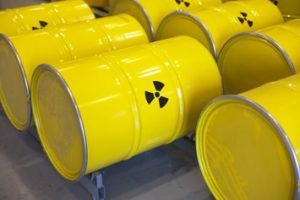The Yucca Mountain Nuclear Waste Repository in Nevada, a project essentially abandoned by the Obama administration, would get a new infusion of funding in President Donald Trump’s Budget Blueprint. Specifically, the president is requesting that Congress authorize $120 million to restart licensing activities for the project and also initiate a “robust interim storage program.”

wellphoto / iStock / Getty Images Plus / Getty Images
No Nuclear Power in Nevada
The 1982 Nuclear Waste Policy Act (NWPA) requires that the Department of Energy (DOE) develop a permanent site for commercial nuclear waste, an undertaking that has been funded by the owners and operators of the nation’s nuclear power plants. In 1987, Congress amended the NWPA to designate Yucca Mountain, Nevada, as the site to build the repository. Since the legislation was passed, the DOE has spent over $15 billion to prepare a license application for the project as required by the Nuclear Regulatory Commission (NRC).
In 2010, the Obama administration refused to ask Congress to continue to fund the project apart from minor administrative activities. The administration had reached the conclusion that nuclear waste permanently stored at the Yucca Mountain site would be vulnerable to earthquakes and also present too high a risk to groundwater. Also, siting a permanent nuclear waste repository at Yucca Mountain has generated ferocious opposition from citizens and all levels of government in Nevada, a state that does not have a nuclear power plant.
Fulfilling the Government’s Obligation
But lawmakers in states that do have nuclear power have long objected to the current Yucca Mountain alternative—temporary storage of spent nuclear materials either at the power plants themselves or at a temporary centralized facility. One lawmaker who does believe the time is right to restart Yucca Mountain is Rep. John Shimkus (R-IL), chair of the House Subcommittee on Environment. Shimkus recently released a discussion draft of legislation that would restart the Yucca Mountain project and also provide for hundreds of miles of new rail lines that would be needed to transport waste shipments to the repository.
“The Nuclear Waste Policy Amendments Act of 2017 provides practical reforms to the nation’s nuclear waste management policy to ensure the federal government’s obligations to dispose of used nuclear fuel and high-level waste can be fulfilled,” said Shimkus and the bill’s cosponsor, Rep. Greg Walden (R-OR). “The discussion draft serves to facilitate feedback from stakeholders as to how best to update our nuclear waste management policy. This proposal was thoughtfully developed through an extensive record of hearings and other oversight over the past six years to identify what may be needed to strengthen the NWPA.”
Preempting State Authority
After Shimkus and Walden announced that they would hold a hearing on the discussion draft, several lawmakers from Nevada requested and received permission to testify. They will all emphasize in the strongest possible terms that the people of Nevada do not want a nuclear waste repository in their state.
“I am highly concerned that your proposed legislation would not only significantly harm the state of Nevada but would infringe upon states’ rights concerning air and water permitting authority,” wrote Rep. Dean Heller (R). “In addition, the benefits provided to host communities are nothing more than unenforceable and illusory promises. Moreover, your legislation ignores the national security risk posed by thousands of nuclear waste shipments to Yucca Mountain.”
“Once again, forces outside Nevada are just trying to pawn off their problems by dumping nuclear waste in our backyard,” said Rep. Ruben Kihuen (D). “As a state with no nuclear energy facilities, it is exceedingly unfair that Nevada is asked to serve as the dumping ground for the rest of the country’s waste.”
But there is strong support for restarting the Yucca Mountain project from non-Nevadans.
“American taxpayers have put over $3.7 billion into Yucca Mountain—they deserve to see it completed,” said Rep. Joe Wilson (R-SC) in a statement. Wilson notes that until Yucca Mountain starts receiving spent nuclear materials, South Carolina will remain a de facto repository for nuclear waste.
The discussion draft is here.
